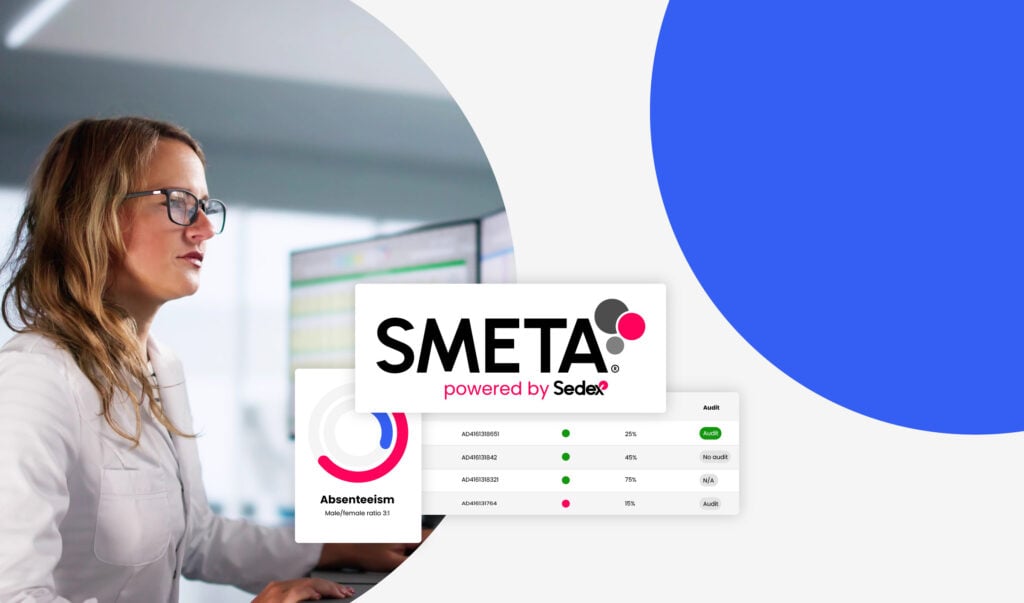Updates to SMETA guidance following external consultation: Summary report
This report provides an overview of the SMETA consultation on 3 proposed changes to the SMETA guidance and tool. It details why Sedex undertook the consultation, the process conducted, the responses received, and decisions made following customer and stakeholder feedback.
Sedex wants to extend our thanks to all the customers and stakeholders who took the time to review and respond to our proposals – over 210 people responded by email or calls and we reached over 1,000 people through the webinars! Sedex has listened to, learnt from, and incorporated this feedback in our decision-making.
We appreciate and value the opportunity to engage with our customers at scale on these proposals and were encouraged by the number of respondents and the constructive, and useful feedback received. Thank you for your participation and we hope that the changes to our guidelines demonstrate our commitment to listening to our customers and interested stakeholders.
The proposed changes
The proposed changes were:
1. Removing the option of announced audits.
2. Specifying that Sedex no longer accept SMETA audits as a robust assessment of current workplace conditions after a period of 24 months. However, there would be no change to recommended audit cadence that high risk sites are audited on a yearly basis, medium are audited every two years, and low at the customer’s discretion.
3. Recommending that all new suppliers to the Sedex platform are audited within 12 months would be helpful to members.
The purpose of these proposed changes was to improve data quality and accuracy as well as improve customer ability to understand and reduce risk in their supply chain. We felt that the proposed changes could better support businesses’ HRDD obligations and improve outcomes for workers and the environment.
Sedex conducted a consultation process with customers and members. An overview of the feedback provided can be found below.
Changes to the SMETA methodology following consultation:
Following feedback Sedex has made the following decisions:
| Proposed updates | Sedex Decision |
| 1. Remove option of announced audits. | Sedex will not be implementing this recommendation in full, but we will update guidance and platform to move customers in this direction to improve quality of audits. We will make the following changes: 1. Guidance / Policy updates: · Update SMETA guidance for Auditors, Buyers and Suppliers to recommend use of semi and unannounced audits only unless announced is required for logistical / other valid reasons. 2. Platform updates to incentivize adoption of semi and unannounced audits: · Update platform to default to semi-announced during audit scheduling · Users that schedule announced audits will need to log a reason for the decision. This is not so that Sedex can approve or decline requests, rather this information will be used for ongoing analysis of audit quality and announced audit use |
| 2. Sedex will specify that we no longer accept SMETA audits as a robust assessment of current workplace conditions after a period of 24 months. | This recommendation will be adopted. We will update the following to align with this change: 1. Buyer, Supplier and Auditor guidance documents. 2. Customer dashboards on the Sedex platform Please note that this will not change access to older audit reports through the Sedex platform. |
| 3. All new suppliers to the Sedex platform to be audited within 12 months. | This recommendation will not be adopted. There was significant push back to this idea and it was felt it was not Sedex’s role to mandate which suppliers should be audited. We are keen to listen to our members and will not be taking this forward. |
Consultation process and feedback:
Sedex wanted to understand customer, auditor and other stakeholder feedback on 3 potential updates to the SMETA guidance and methodology. To do this, Sedex conducted the following activities:
1. Sent an email to all members that Sedex was holding an open consultation on proposed changes to the SMETA guidance and methodology with full details of proposed changes
2. Posted an overview of the proposed changes on the Sedex website (available to all) with an explanation of why these changes were being considered. This document provided information on feedback channels and requested stakeholders get in touch with their comments and concerns over email.
3. Held 2 global webinars to explain the changes and gather feedback to global customers and stakeholders
4. Held calls with interested customers and industry groups on request
5. Requested email feedback
These activities took place between the 24th February and 31st March.
Sedex held numerous 121 customer calls and received email responses representing 210 stakeholders to the consultation. In addition, 1073 people registered for the webinars, providing feedback through online polling and in comments.
Below is a summary of the feedback received for each proposed change and the decision Sedex made as a result of this feedback:
1. Removing the option of announced audits
Opinion given during the webinar was divided on this proposal; 46% of call participants believed that this change would achieve the proposed benefits, including improved data quality, while 47% felt it would not.
There was a significant amount of support for removing announced audits among buyers and auditors. Some buyers reported that they have already implemented this change in their own programmes while auditors stated that it would help with audit scheduling.
The removal of announced audits was strongly contested by many suppliers who expressed concerns about this change, stating it would be very difficult to accommodate or even operationally unfeasible. Part of the pushback came from a misinterpretation where suppliers assumed all audits would be unannounced, this is not the case and we recommended a move to semi-announced.
However, even with semi-announced, a commonly cited issue was how to audit sites without specifying a day where HR teams were based elsewhere. This would lead to challenges getting the necessary paperwork and information required to conduct the audit.
48% of email respondents stated that it would be unworkable in practice, even if they agreed with it in theory, and supplier members reported strong concerns, particularly regarding the potential for disruption to business.
SEDEX DECISION:
Sedex will not be implementing this recommendation in full, but we will update guidance and platform to move customers in this direction and recommend semi-announced audits as the default option.
We will make the following changes:
1. Guidance / Policy updates:
· Update SMETA guidance for Auditors, Buyers and Suppliers to recommend use of semi announced or unannounced audits only unless announced is required for logistical / other valid reasons.
2. Platform updates to incentivize adoption of semi and unannounced audits:
· Update platform to default to semi-announced during audit scheduling
· Users that schedule announced audits will need to log a reason for the decision. This will help with ongoing analysis of audit quality and announced audit use.
2. Specifying that Sedex no longer accept SMETA audits as a robust assessment of current workplace conditions after a period of 24 months
This suggestion aligned with some of our customers’ existing programmes. There was significant support for this decision with 61% of webinar respondents stated that this change would help to meet the aims of improving the quality of data and 89% positive or neutral on ease of implementation. On email there was less feedback on this issue then the other 2 proposals.
Most concerns expressed were around the change increasing the cadence of audit for low risk suppliers, however our guidance on cadence will not change. Our recommendation is that the information within an audit is valid for up to 2 years.
There is no mandate for a 2-year audit cadence within this proposal. To clarify the Sedex position, we will continue to recommend that high risk suppliers (as identified through our risk tools) are audited yearly, medium risk every 2 years and low risk at a buyer’s discretion.
Where suppliers are low-risk we do not recommend a cadence, but leave this up to a buyers discretion – this could include auditing a random sample of low risk suppliers, auditing on an ad hoc basis or not auditing at all.
SEDEX DECISION:
This recommendation will be adopted.
We will update the following to align with this change:
1. Buyer, Supplier and Auditor guidance documents
2. Customer dashboards on the Sedex platform
a. This will not impact access to audit reports or audit data, all audits will remain accessible to members.
3. Recommending that all new suppliers to the Sedex platform are audited within 12 months would be helpful to members
While some buyers said that they supported this decision, almost one third (31%) of webinar participants and 28% of email respondents said that they would not be able to implement this recommendation.
There were concerns that this guidance would prevent suppliers from joining Sedex and that it did not align with risk based human rights due diligence – a key principle on which Sedex products and guidance is based on.
SEDEX DECISION:
This recommendation will not be adopted – no further action will be taken.
Next steps
These changes will not come into effect immediately. Sedex will:
· Update our guidance in the Supplier, Buyer and Auditor manuals by July
· Update the platform in 2025.


